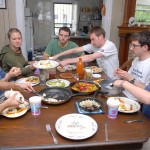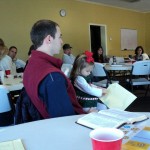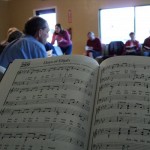The supper is a genuine meal, not a ritual to be administered
One of my favorite bloggers, Dave Black, wrote a few thoughts on the “Lord’s Supper” on his blog (Monday, July 29, at 6:58 p.m.).
Earlier (Sunday, July 28, at 5:15 p.m.), Dave had explained that for the first time the believers he gathers with shared a single loaf of bread and a single cup as the Lord’s Supper. I love the fact that Dave celebrates the small steps that a group is willing to take. As we read his further thoughts, it’s easy to see that he would love to change the “Supper” among that church even more. Well, he doesn’t want to change it… he wants to see God change it.
Here are some of the observations that Dave makes concerning the “Lord’s Supper” (from 1 Cor 11 primarily, but also from 1 Cor 10 and Acts 20):
1) The Lord’s Supper is the centerpiece of the Christian assembly.
2) The supper is superbly Christ-centered (“Do this in MY remembrance”).
3) No believer is “invited” to partake of the supper; we eat and drink in obedience to Christ’s command (“Do this” is in the imperative mood).
4) The supper is a genuine meal, not a ritual to be “administered.”
5) The emphasis is both on remembering and anticipating.
6) It is a joyous celebration and not a sorrowful funeral.
7) The meal symbolizes the unity of the Body of Christ.
8) ALL are to partake, and ALL are to partake together.
9) The “unworthy manner” to which Paul refers has nothing to do with one’s spiritual status at the time of eating. It refers to eating and drinking in a divided manner.
10) Self-examination is a necessary part of the Christian life, but in 1 Cor. 11 it is not a reference to the preparedness on the part of the believer. It is a call to observe the social nature of the meal in which distinctions based on partiality of any kind are forbidden.
11) The one loaf of bread not only symbolizes this unity but in some sense creates it.
12) Because there is only one loaf of bread, we are one body no matter how many we are or how diverse we may be. “Many yet one.”
Can you imagine gathering with your brothers and sisters in Christ around a table of food? Can you imagine eating and talking together knowing that Jesus is present (because he is and because it’s his meal)? Can you imagine how much different the teaching, encouraging, serving, and fellowship would be?
So, what would be the benefits of gathering in the way that Dave describes above? Would there be any disadvantages?
Transitioning toward participatory church gatherings
Yesterday, on Dave Black’s blog (Thursday, July 18, 2013 at 7:48 a.m.), I read a snippet of an article on the website of Milipitas Bible Fellowship written by Brian Anderson. The article is called “Discovering Participatory Church Meetings.”
The article includes some great historical information, from the Jewish background, to New Testament evidence, into the second through fourth centuries, and even including the reformation. At each point, the author explains what was happening historically and how those events and circumstances affected the way that believers gathered together.
But, my favorite part of the article is near the end and is called “Our Journey in Implementing Participatory Meetings.” I love how the author explains some of the steps they took together to help each other understand why it’s important that they all participate together when they gather with the church.
For example, here’s one “step” in the process:
After a few months, as we became more comfortable with these informal home meetings, we began introducing more participation into our Sunday gatherings. I informed the congregation that anyone could participate by reading Scripture, praying during a lull in our praise singing, or starting a song that was on their heart. I brought the podium down from the platform to the lower level so that I could be closer to the people, thereby encouraging mutual interaction. We rearranged the chairs into concentric semi-circles so that we could look into one another’s faces when speaking, instead of the back of someone’s head. We bought a wireless microphone and began passing it around to those desiring to share what God had been doing in their lives or to encourage us by declaring what God had been teaching them from His Word. Sometimes these sessions included exhortations, admonitions, teachings, or the sharing of blessings or burdens. One woman revealed that she had recently been diagnosed with cancer. This allowed the whole church the opportunity to tangibly express their love and commitment by gathering around, laying hands on her, and praying. These changes felt a bit awkward at first. We had no previous model to guide us, and thus, felt a bit uncomfortable with them. Before long, however, many began contributing some very edifying insights and exhortations.
Take the time to read this great article, especially that last section. Many people believe that “traditional church” can never change. It’s just not true. It’s happening more and more.
However, in order for this kind of change to be effective, we must make careful changes, caring about the people involved more than we care about making sure we’re doing everything right.
For many of my readers, the quotation above sounds overly rigid and controlled. For others, it sounds incredibly freeing. For still others, it looks strange, alien, and completely impossible.
For me, the exciting part of this article is that they realized they needed to change, and they took the steps necessary to implement that change in a way that worked for them.
Let’s all stand and worship the Lord together…
If you follow me on Twitter (@alan_knox) or if you “like” my Facebook page, then you know that I link to several older posts each day along with linking to my new post of the day. I started linking to this older posts a couple of years ago in order to continue the conversations on those posts, and it has worked tremendously!
For example, yesterday I linked to a post I wrote two years ago called “Why keep the worship service?” Believe it or not, my thoughts about the church began to change drastically when I began to study the “worship service” from the perspective of Scripture. In short, I couldn’t find it. Instead, I found believers gathering in completely different ways from the “worship service.”
In response to that link yesterday, Doug from “With your Latte” (a great blog name, by the way) left a comment on my older post and wrote a post of his own called “Why a Worship Service?”
In part of that post, Doug writes:
I have questioned the worship service many times myself and have asked others about it. The question of doing away with the worship service is normally met with a look of puzzlement. The idea of not having “church,” in the tradition sense, is just too far of a reach – its a foreign concept to be embraced only by the poor and/or persecuted. Besides, where would the clergy find employment? – (that was some of the cynicism i mentioned)
Before you brush off this question, ask yourself where in Scripture we find a description even remotely similar to the modern “worship service.” For something so important that it defines most church groups today, you would think it would be found somewhere in the New Testament at least… in one of the passages that discusses believers gathering together. But, no.
A few years ago, I made an interesting discovery. During the “Reformation,” Martin Luther took the Roman Catholic Mass and modified it slightly and called it “Divine Service” (i.e., “worship service”). This is the pattern that most Protestant (non-Catholic, non-Orthodox) church groups follow today – both “traditional” and “contemporary.” Oh, sure, there may be differences here and there, but for the most part, it’s the same.
But, guess what? Luther designed this “worship service” for unbelievers, not for the church. Luther did not believe that “true believers” should meet in this way. He had a different kind of gathering in mind for Christians, but he could not find anyone interested in this other kind of meeting. In other words, Luther was suggesting something very similar to how “house”, “organic”, “simple” churches gather today. (For more information about Luther’s different kinds of “divine service” see my posts “Luther and the non-Christian ‘worship service’” and “Luther and the Church.”)
So, I’ll ask the same question that I asked in that earlier post: Why keep the “worship service” for the church?
Come now, let us reason together…
No, this post is not about Isaiah (from Isaiah 1:18). Instead, it is about the early church as described by Luke in the book of Acts.
But, you may be wondering, what does “reasoning together” have to do with the early church? Not only is this related to the early church, but the phrase “reasoning together” is used by Luke to describe what happened when the church gathered together.
Here’s the passage that I’m talking about:
And he [Paul] entered the synagogue and for three months spoke boldly, reasoning and persuading them about the kingdom of God. But when some became stubborn and continued in unbelief, speaking evil of the Way before the congregation, he withdrew from them and took the disciples with him, reasoning daily in the hall of Tyrannus. This continued for two years, so that all the residents of Asia heard the word of the Lord, both Jews and Greeks. (Acts 19:8-10 ESV)
If you would allow me, I’d like to retell this story in my own words. It begins with Paul coming back to Ephesus. He had visited the city briefly, and had returned. As was his custom, his began by going to the synagogue where he often found people who were interested in hearing about God’s kingdom and the gospel of Jesus Christ.
Luke says he continued gathering with the synagogue for three months. Now, he may have only met with them weekly on the Sabbath, but many texts from that time period indicate that Hellenistic Jews gathered as the synagogue more often than weekly. Regardless, while Paul was gathered with them, he had opportunities to proclaim the gospel of Jesus Christ. Some believed and began to walk in “the Way” (one of the earliest names given for following Jesus Christ, i.e., Christianity). However, others became more stubborn and contentious and even began to “speak evil” of the new manner of life in Jesus Christ that Paul was proclaiming.
So, Paul and the disciples stopped gathering with the synagogue and began gathering in “the hall of Tyrannus.” For two years, followers of Jesus Christ in the city of Ephesus gathered daily at that hall (perhaps a school?). (I’m not assuming that the same group of believers gathered every day. I’m assuming that at least some of the believers were there at some point every day.)
What did the disciples of Jesus Christ do when they gathered at the hall of Tyrannus? They were “reasoning.” What does this mean? While the word “reasoning” is a translation of the Greek verb διαλέγομαι (dialegomai). This is the verb that eventually becomes the English verb “dialog.” But, we can’t assume that’s what διαλέγομαι (dialegomai) means – that would be a logical fallacy.
Instead, let’s look at a few other places where διαλέγομαι (dialegomai) is used in Scripture:
But they kept silent, for on the way they had argued (διαλέγομαι – dialegomai) with one another about who was the greatest. (Mark 9:34 ESV)
But when the archangel Michael, contending with the devil, was disputing (διαλέγομαι – dialegomai) about the body of Moses, he did not presume to pronounce a blasphemous judgment, but said, “The Lord rebuke you.” (Jude 1:9 ESV)
We can see that this verb is used to indicate some type of discussion (at least in the instances above). It definitely did not indicate one person speaking.
We also find this verb used to describe what Paul did when he gathered with other Jews among the synagogue:
And Paul went in, as was his custom, and on three Sabbath days he reasoned (διαλέγομαι – dialegomai) with them from the Scriptures… (Acts 17:2 ESV)
So he reasoned (διαλέγομαι – dialegomai) in the synagogue with the Jews and the devout persons, and in the marketplace every day with those who happened to be there. (Acts 17:17 ESV)
This makes sense also, since we know that many of the Jews often disagreed with him. We can assume that Paul would not have been allowed to make a prolonged speech concerning the gospel without some response from those who disagreed.
In fact, Luke used the same verb to describe what Paul did in the synagogue in Ephesus, both the first time he visited the city and also in the passage quote above just before he and the disciples left the synagogue:
And they came to Ephesus, and he left them there, but he himself went into the synagogue and reasoned (διαλέγομαι – dialegomai) with the Jews. (Acts 18:19 ESV)
And he entered the synagogue and for three months spoke boldly, reasoning and persuading (διαλέγομαι – dialegomai) them about the kingdom of God. (Acts 19:8 ESV)
We also find this same other verb later in Acts when Paul spent some time with the church in Troas:
On the first day of the week, when we were gathered together to break bread, Paul talked (διαλέγομαι – dialegomai) with them, intending to depart on the next day, and he prolonged his speech until midnight. There were many lamps in the upper room where we were gathered. And a young man named Eutychus, sitting at the window, sank into a deep sleep as Paul talked (διαλέγομαι – dialegomai) still longer. And being overcome by sleep, he fell down from the third story and was taken up dead. (Acts 20:7-9 ESV)
So, for Luke especially, one of the favorite verbs to describe what happened when the church gathered is a verb that points to some type of discussion… so much so that it can even be used to describe a dispute or argument.
Hanging with friends at the beach… but how can I call this church
As I mentioned last week in my post “Gathering with the church at the beach again,” instead of gathering as we normally do on Sunday, we spent yesterday at Wrightsville Beach, NC (near Wilmington, NC).
Most of the people were from this area and meet with us regularly. One family moved from here to the Atlanta area about three years ago. A couple of families spent Saturday night in Wilmington. Most of us drove to the beach Sunday morning. Some began arriving around 9:00 a.m., while the others arrived between then and about 1:00 p.m.
We helped each other carry coolers, and chairs, and boogie boards, and other assorted stuff from cars to the beach, and we helped each other find parking places. (Parking was awful!) We hung out in the shade of a pier, played volleyball, and played in the surf and sand. (Okay, full disclosure: I hurt my knee running a half marathon a couple of week ago, so I didn’t play volleyball or play in the surf or sand. I just hung out under pier.)
There was no sermon. No one gave a formal “teaching.” We didn’t sing any songs. We didn’t stop to take prayer requests. We didn’t pass an offering plate.
So, how can I call this “church”?
Well, it’s “church” because we are all brothers and sisters in Christ (children of God) and we were gathered together. That is “church” – based on the Greek term “ekklesia” associated with followers of Jesus Christ.
Being “church” (ekklesia) is not about what we do or don’t do – although some things may help us grow in maturity in Jesus Christ more than other things. Being “church” (ekklesia) is about who we are together in Jesus Christ.
We started disbanding around 2:00 p.m. Others stayed until after 6:00 p.m. Some came back home to the Wake Forest / Youngsville area; others drove to Myrtle Beach or the Outer Banks; still others stayed in the Wilmington area. And, of course, our friends who moved away three years ago drove back toward Atlanta.
While we’re separated, we remain children of God and followers of Jesus Christ. But, when we come together (anytime we’re together with any other brothers and sisters in Christ), we become “ekklesia” (church) in Jesus Christ – wherever we are and whatever we’re doing.
The Church that Gathers at McDonalds
Yesterday, a commenter named Carlos left a comment on my post “But what do you do when you get together with the church.” While I know that God is not leading everyone to make the exact same decisions that Carlos is making, I love the heart of his comment. So, I wanted to share it to a wider audience (i.e., I’m hoping more people will read this post than would read that comment).
While there are several parts of Carlos’ comment that I appreciate, I really love what he says toward the end about “talk.” My favorite times of gathering with my brothers and sisters in Christ is when we get together to serve someone.
Anyway, here is Carlos’ comment:
————————————————
You seem to have a real good grasp of what church is supposed to be Alan. I wholeheartedly want to encourage you to continue being a voice for truth in this area through your blog. God knows how much voices like yours need to be heard.
I myself have entirely ceased to “go” to Sunday services. I’ve had enough. If I never step into another “church” foyer as long as I live that will be just fine by me and as far as I can tell just fine with the Lord.
Instead I have decided before the Lord to begin reaching out to others through my natural relationships, through flyers, or whatever other means I can where I live (San Diego) to gather anyone interested in discussing what the Lord meant church to be at a local McDonald’s.
The Lord has led one Christian to join me for discussions and although we have only met once so far, it was very good (we’re meeting again tomorrow morning). My prayer and hope is that others might come out of the woodwork to join us.
I do wonder sometimes how effective this is going to be as most Christians are in churches already. I mean the Sunday thing type of church.
As such I would think that most will not want to go discussing things at a McDonald’s with others. I mean church for them is this convenient thing that happens on Sundays. Something many are quite content with.
Still… I am hoping that there are some, somewhere that are disappointed with church as it is, read about a different practice of church in the New Testament, and want more of what they read than what they have experienced of Christ in the church in North America.
You know one thing the Lord has laid on my heart these last few days is how greatly lacking in real love so-called Christians really are. I mean probably 95% of what happens “in” church (i.e. the building connected activities) is…well…TALK.
Nothing but TALK. Sermon talk. Singing talk. Home fellowship talking. Bible study talk. Prayer meeting talk. Talk, talk, talk.
I know people who are in need all over the place! One man I know has lung cancer, diabetes, hepetitus C, doesn’t have car insurance, lives in his car. The cops have told him he can’t stay in the parking lot he was in (a church parking lot no less!).
He is dying and literally has no resources and no place to simply park or even take a consistent shower.
And where are the so-called Christians?
In their buildings having a good ol time. Makes me sick.
The Lord has enabled me to be a wonderful testimony to him and to befriend him but I have no resources to speak of to be able to help him (I sleep in a tent myself – long story).
I know no Christians who would even let him park in their driveways until he dies!
Sick.
Anyway…yeah. I am all for being the Body of Christ in this world alongside others. People can keep their Sunday churchy thing. I don’t want anything to do with it anymore.
Carlos
Gathering with the church at the beach again
As many of my readers know, we gather regularly with the church on Sunday mornings in a rented facility. We gathered at unscheduled times throughout the week as well. But, we like to change up those scheduled Sunday gatherings as well, to remind us that we are the church whenever and wherever we gather together.
Sometimes we go camping together. Sometimes we gather in homes instead of the rented facility. Sometimes we get together on Sundays at a local lake or park.
But, one of our favorite places to gather is the beach. Once or twice each summer, we spend Sunday at Wrightsville Beach. We talk, play in the sand and sun and surf, eat together, play volleyball, etc. It’s always a great time to relax and encourage one another.
We also always invite other people to join us. We’ve had family members, friends, and neighbors join us at various beach trips. Last summer, Randi (a frequent commenter here) and her family joined us. And they plan to join us again this Sunday!
That’s right, we’re headed to beach again this Sunday, June 16! Several of us will make the trip to the beach that morning, and besides Randi and her family, some friends from the Atlanta area are planning to meet us there as well.
If you’re in the area of Wrightsville Beach, NC on Sunday, June 16, or if you’re willing to make the trip like we are, let me know. I’ll be glad to share the details with you so that you can join us. Simply email me at alan[at]alanknox[dot]net for more information.
We need to hear each other’s stories
Mutual edification is more than just another option or a good idea. It is necessary for the church grow in maturity.
What do I mean by mutual edification? “Mutual” refers to each part of the church working together to impact every other part of the church. It doesn’t mean that everyone speaks, but it does mean that everyone has the opportunity to speak. “Edification” refers to our purpose in speaking together and/or serving together, which is to help one another grow (“edification” = “build up”) in maturity in Jesus Christ, which includes knowing Jesus and being united with one another.
This is exactly what Dan (from “Cerulean Sanctum“) is talking about in his post “Why I Didn’t Go to Church on Sunday.”
In the post, Dan explains why he didn’t gather with the church last Sunday. While he pointed out the specific topic of the sermon that day in the beginning of the post, by the end of the post he gets to the real problem: a lack of mutual edification. Dan writes:
Your story of Jesus has value to me. Not just the pastor’s story, but yours. Mine has value to you too. Wouldn’t it be great if we could hear those stories? Wouldn’t it be wonderful to see your story and mine fit within that greater Story?
Yes, I think they would be so excellent to hear. Now if only we could find some time in church on Sunday to squeeze them in.
You see, it has been decided by “the powers that be” that “mutual edification” is not as important or as expedient as one person given a great speech (sermon). (Many times – perhaps most often – this decision has already been made by tradition that is rarely, if ever, questioned.) That’s not a decision that can be supported by Scripture – unless, of course, you take certain passages out of context and completely leave out huge chunks of Scripture.
I sympathize with Dan and many, many others like him who have decided it’s just not beneficial to “attend church” anymore, And, in many cases, they’re probably right. It would probably be much more beneficial for them as followers of Jesus Christ for them to share lunch and their stories with a few brothers and sisters in Christ.
Oh, trust me, if people started doing that they would miss the great singing and the well-crafted and -studied sermons. But, they would get much, much more out of their time spent together.
But what do you do when you get together with the church?
Last week, I had a great conversation with a brother in Christ on Facebook. That conversation reminded me of another conversation.
A young man started gathering with us on Sunday mornings a few years ago. Soon, he completely understood what we were all about, and he was sharing his life with other people among the church. He began serving people with the many gifts and talents that God had given him. In spite of being part of churches (even famous churches) for many years, he loved and thrived in an environment of mutual edification and discipleship.
He began to explain our understanding of church to his friends. He would explain about sharing our lives with one another – spending time with one another throughout the week – hanging out with each other at coffee shops – going to dinner with one another – helping each other with service projects – and on and on.
Eventually, (he told me) his friends would always come to the same question: “Yes, but what do you do when you get together with the church on Sunday morning?”
He would tell them that we often pray together, sing together, study Scripture together, eat together. They would tell him that they do the same things with the church on Sunday mornings (except eat together). He would try to explain that he’s not talking about the things we do when we gather together; he’s talking about a shared life in Jesus Christ, with a planned gathering as only one aspect of that life.
But, as much as he would try to explain it to them, they would always return to this: “But, we do the same things when we gather with the church.”
See, the thing is, my friend had learned that church is not about the things you do when you get together with other believers. Instead, the fellowship and shared lives is more important than any particular activity. Oh, there will be certain activities. You will want to pray for one another, and you will want to sing along when God has placed a song on someone’s heart, and you will want to understand Scripture, and you will want to eat together…
However, the activities are not the point. In fact, the activities should flow out of our shared lives together. The activities are not a beginning or an end in themselves.
But, until someone understand the importance of fellowship in Jesus Christ – actually sharing lives with one another, not just attending a meeting together – then the activities have to take central stage. (And, thus, we have fights and wars over exactly how to do those activities…)
When fellowship in Jesus Christ becomes central – because Jesus Christ is central – then the activities (and exactly how to do the activities) become less important.
So, “what do we do when we get together with the church?” We share our lives with one another… “No, I mean, what do you DO? What activities?” Whatever is necessary to help one another grow in Jesus Christ.
Ch-ch-ch-ch-changes… and the church
No, I’m not writing this post about changes on this blog or even about changes in my own life. Our family has been through several changes over the last year or so, but I’ve already written about those.
This post is about changes and the church.
Over the last few years, I’ve come to expect two things when it comes to change and the church: 1) Change should be expected and constant, and 2) Change is not comfortable.
The church is people – God’s people gathered together. Since we are God’s people who are indwelled by the Holy Spirit and following Jesus Christ, we are in a constant state of change. We are growing in maturity (hopefully); our life situations are changing; God is continually working in and through us.
Put us together, and there is even more change. And, this doesn’t even count the people who are moving away, or new people who start gathering with us.
If we are truly interacting with one another when we gather with the church, then that interaction will change as well. Our relationships are changing, our struggles are changing, and our manner of following Jesus is changing. All of this adds up to even more change.
But, do we see this change reflected among the church, especially when we gather together? Oh, we may tweak something here or there, but, for the most part, it’s all the same week after week, month after month, year after year.
All of this indicates that the way we are meeting (generally among the church) does not actually reflect the people at all.
However, most people are fine with that. Why? Because change is uncomfortable. We want things to stay the same, especially when things are actually changing. The apparent lack of change makes us think that everything is fine. We want the distraction from real life.
But, that’s just it… it’s not real life.
And, if it’s not real life, then we’re not helping each other with real life. Putting on something that’s stable and unchanging (even if it’s “excellent”) is not beneficial to the growth and health of the church.
Yes, change is uncomfortable. But, our goal should never be to help people remain comfortable where they are. Our goal should always be to help one another understand where we are and where God is taking us (both as individuals and as a group). This is only possible if we embrace that change that we are all going through, and allow that change to be reflected as we gather together.
Of course, that can only happen if the people (all of us – one another) truly participate with one another as we gather together.









